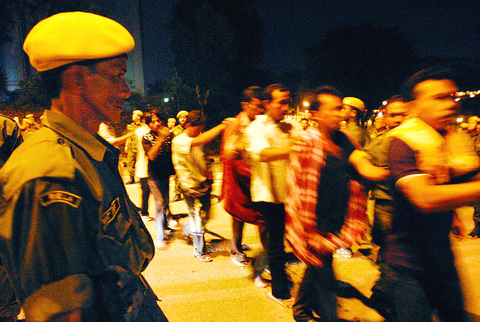A crackdown that forced tens of thousands of mostly Indonesian illegal workers out of Malaysia has created a shortfall of cheap labor in critical industries, a newspaper reported yesterday.
Malaysian officials said bureaucratic bottlenecks at Indonesian emigration centers charged with providing proper documentation to Indonesians so they can return to work legally in Malaysia is endangering its construction and plantation sectors.
A program allowing Indonesians who left Malaysia under a recently ended amnesty to legalize themselves in Indonesia has come to a virtual standstill because of administrative delays there, The Star newspaper reported.

PHOTO: EPA
"I think it is in Indonesia's benefit to facilitate the workers' return because Malaysia has already done its part. Otherwise, we may have to source workers from other countries," the newspaper quoted the Malaysian Employers' Federation president, Mohamad Jafar Abdul Carrim, as saying.
No immediate comment from Jakarta on the report was available.
About 450,000 illegal workers are believed to have left Malaysia during the amnesty period, which ended Feb. 28.
An estimated 400,000 still remain in the country. The amnesty has been followed by a raid-and-arrest crackdown at work sites, which has netted nearly 1,000 workers so far.
Foreign workers from Indonesia, the Philippines, Bangladesh and India form the backbone of Malaysia's construction and plantation industries, doing low-paid jobs that Malaysians won't do.
About 1 million of them work legally.
Malaysia has promised to take back workers who left voluntarily during the amnesty program, provided they come in with proper papers.
As part of a deal made with Malaysia, Indonesia set up one-stop centers to process applications from Malaysian employers to legalize their former Indonesian employees.
But at one such center in Indonesia not one application has been approved in the last 10 days, The Star reported.
Home Minister Azmi Khalid and a team of officials are currently in Jakarta to meet top Indonesian officials to resolve the problem.
"We acknowledge that there is bottleneck and hope to sort things out with our counterparts here," Immigration Department enforcement director Ishak Mohamed was quoted as saying.
Mohamad Jafar of the employers' federation said at least two main economic sectors -- construction and plantations -- were critically hit by the delay in getting the workers back.
"House buyers face not getting their homes delivered on time, and developers will be liable for not completing their projects within the stipulated timeframe," he told the newspaper.
Mohamad Jafar said Indonesians made up 90 percent of the labor force in the construction industry, and between 50 percent and 60 percent on plantations.
Human Resources Minister Foong Chan Onn said Malaysia is already looking at other sources of labor such as Vietnam, Thailand and the Philippines.

FRUSTRATIONS: One in seven youths in China and Indonesia are unemployed, and many in the region are stuck in low-productivity jobs, the World Bank said Young people across Asia are struggling to find good jobs, with many stuck in low-productivity work that the World Bank said could strain social stability as frustrations fuel a global wave of youth-led protests. The bank highlighted a persistent gap between younger and more experienced workers across several Asian economies in a regional economic update released yesterday, noting that one in seven young people in China and Indonesia are unemployed. The share of people now vulnerable to falling into poverty is now larger than the middle class in most countries, it said. “The employment rate is generally high, but the young struggle to

ENERGY SHIFT: A report by Ember suggests it is possible for the world to wean off polluting sources of power, such as coal and gas, even as demand for electricity surges Worldwide solar and wind power generation has outpaced electricity demand this year, and for the first time on record, renewable energies combined generated more power than coal, a new analysis said. Global solar generation grew by a record 31 percent in the first half of the year, while wind generation grew 7.7 percent, according to the report by the energy think tank Ember, which was released after midnight yesterday. Solar and wind generation combined grew by more than 400 terawatt hours, which was more than the increase in overall global demand during the same period, it said. The findings suggest it is

STEPPING UP: Diminished US polar science presence mean opportunities for the UK and other countries, although China or Russia might also fill that gap, a researcher said The UK’s flagship polar research vessel is to head to Antarctica next week to help advance dozens of climate change-linked science projects, as Western nations spearhead studies there while the US withdraws. The RRS Sir David Attenborough, a state-of-the-art ship named after the renowned British naturalist, would aid research on everything from “hunting underwater tsunamis” to tracking glacier melt and whale populations. Operated by the British Antarctic Survey (BAS), the country’s polar research institute, the 15,000-tonne icebreaker — boasting a helipad, and various laboratories and gadgetry — is pivotal to the UK’s efforts to assess climate change’s impact there. “The saying goes

TICKING CLOCK: A path to a budget agreement was still possible, the president’s office said, as a debate on reversing an increase of the pension age carries on French President Emmanuel Macron yesterday was racing to find a new prime minister within a two-day deadline after the resignation of outgoing French Prime Minister Sebastien Lecornu tipped the country deeper into political crisis. The presidency late on Wednesday said that Macron would name a new prime minister within 48 hours, indicating that the appointment would come by this evening at the latest. Lecornu told French television in an interview that he expected a new prime minister to be named — rather than early legislative elections or Macron’s resignation — to resolve the crisis. The developments were the latest twists in three tumultuous